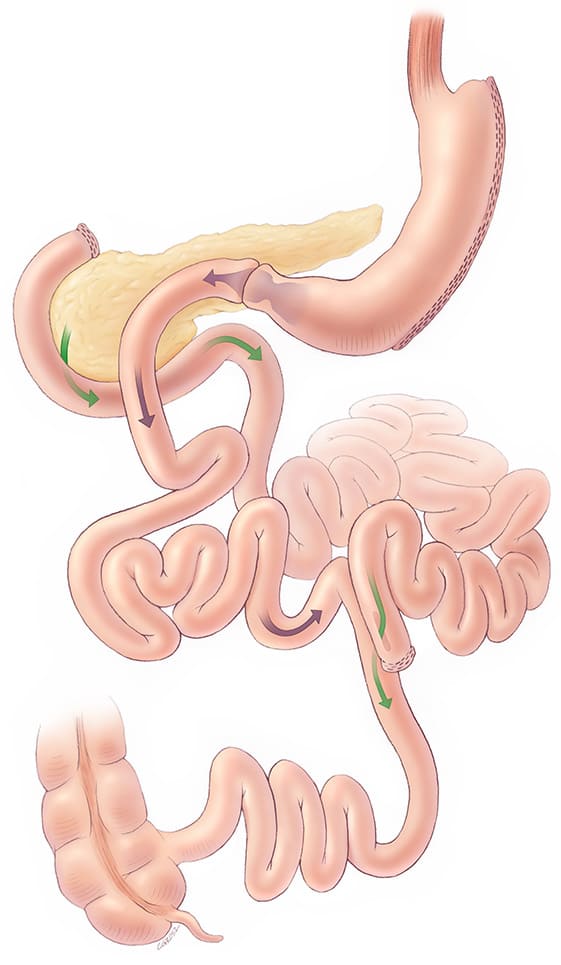Duodenal Switch Surgery
Overview of Duodenal Switch Surgery at Loyola
The Duodenal Switch is one of the weight loss surgeries offered by Loyola Medicine’s highly skilled bariatric surgeons.
Also called a biliopancreatic diversion with duodenal switch, the procedure involves two elements that combine to help significantly overweight patients dramatically lose weight.
In a duodenal switch operation, a surgeon will remove about 70 to 80% of your stomach, leaving a tube-like pouch. This will help you feel full more quickly and therefore restrict how much you eat.
Also, part of your small intestine is rerouted so that food travels through your digestive system more quickly. This leads to even more weight loss because your body absorbs less fat and calories from what you eat (known as malabsorption).
This procedure usually is performed laparoscopically, a minimally invasive surgical technique that uses smaller incisions and leads to less loss of blood, less scarring and a faster recovery time.
Benefits of Duodenal Switch Surgery
The duodenal switch procedure is used for patients who are significantly overweight and have had trouble losing a large amount of weight using diet and regular exercise.
Generally, If your body mass index (BMI) is greater than 50 – or you have a lower BMI but have other weight-related medical conditions – you may be a candidate for duodenal switch surgery.
This procedure usually results in more weight loss than the other types of bariatric surgeries, and most patients are able to lose up to 80 percent of their excess weight. Other benefits include:
- Decreased appetite
- Better quality of life
- Improved medical conditions, including Type 2 diabetes, sleep apnea and high cholesterol
- Part of the procedure (the changes to your small intestines) is reversible if you experience complications
Why Choose Loyola for Duodenal Switch Surgery?
The expert weight loss doctors at Loyola Medicine are experienced in performing duodenal switch procedures. Loyola is designated as a Comprehensive Center by The American College of Surgeons, making it one of Chicagoland’s premier weight loss centers. Patients who have a bariatric surgery procedure at Loyola also take part in our medical weight loss program to help you reach and maintain a healthy weight.
Loyola physicians are involved in research trials that may lead to new discoveries in the treatment of obesity and obesity-related illnesses.
What You Can Expect from the Duodenal Switch Procedure
On the day of your procedure, you will be given a general anesthetic. Most duodenal switch surgeries are performed as a minimally invasive procedure that requires only a few small incisions on your abdomen. Your surgeon will use a tiny video camera (laparoscope) and thin surgical instruments.
During the surgery, the left side of your stomach will be removed. Your small intestine will be divided; one part will be used to create a shorter route for food that bypasses most of your digestive tract, the rest of your small intestine will continue to carry bile from the gall bladder and digestive juices from the pancreas. The procedure will preserve part of your duodenum, the first section of the small intestine.
The surgery will take three to four hours (some patients will receive the procedure in two separate surgeries). You will spend two or three nights in the hospital and will be able to return to normal activities within about two weeks.
After the procedure, you will be able to have liquids, then pureed foods and eventually solid foods. You’ll find that you feel full after a small meal. Part of your food will pass through your shortened intestines without being digested.
Your digestive tract will absorb nutrients less efficiently, and you will need to take nutrition supplements and follow dietary guidelines.
Our multidisciplinary team of surgeons, bariatricians, nutritionists and psychologists work together to ensure everything is working properly and you have the tools you need to succeed prior to leaving Loyola. Most patients start to lose a significant amount of weight over the next 12 to 18 months.
Risks of Duodenal Switch
Loyola surgeons are experienced in the duodenal switch surgery, and complications are minimal. However, the surgery is a major procedure, and you may experience the following risks and side effects:
- Possibility of bleeding, blood clots and infection
- Vomiting may occur from eating more than your stomach can handle
- Perforation or leak in organs such as bowel, duodenum or stomach
- Higher risk of developing gallstones
- Heartburn may develop after the procedure
- Swelling around the stomach and small bowel that leads to difficulty consuming liquids
Part of the procedure, the reduction to the size of your stomach, is not reversible.
Weight Loss Locations at Loyola
Loyola offers medical weight loss opportunities in Melrose Park and Hickory Hills through the Center for Metabolic Surgery and Bariatric Care. Procedures and more extensive surgeries are performed at Loyola University Medical Center in Maywood.
Weight loss seminars and support groups are available at several locations across the Chicagoland area. Find all locations.

